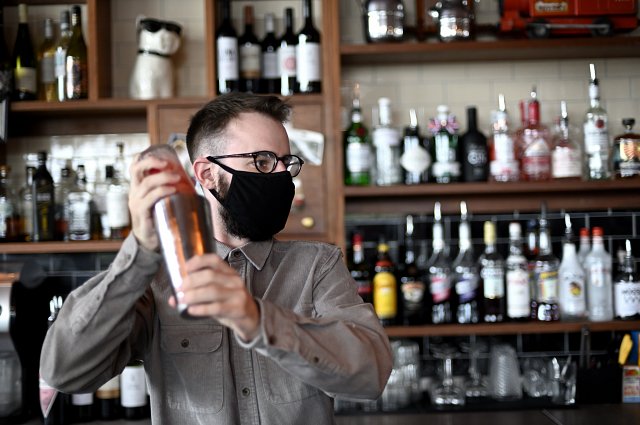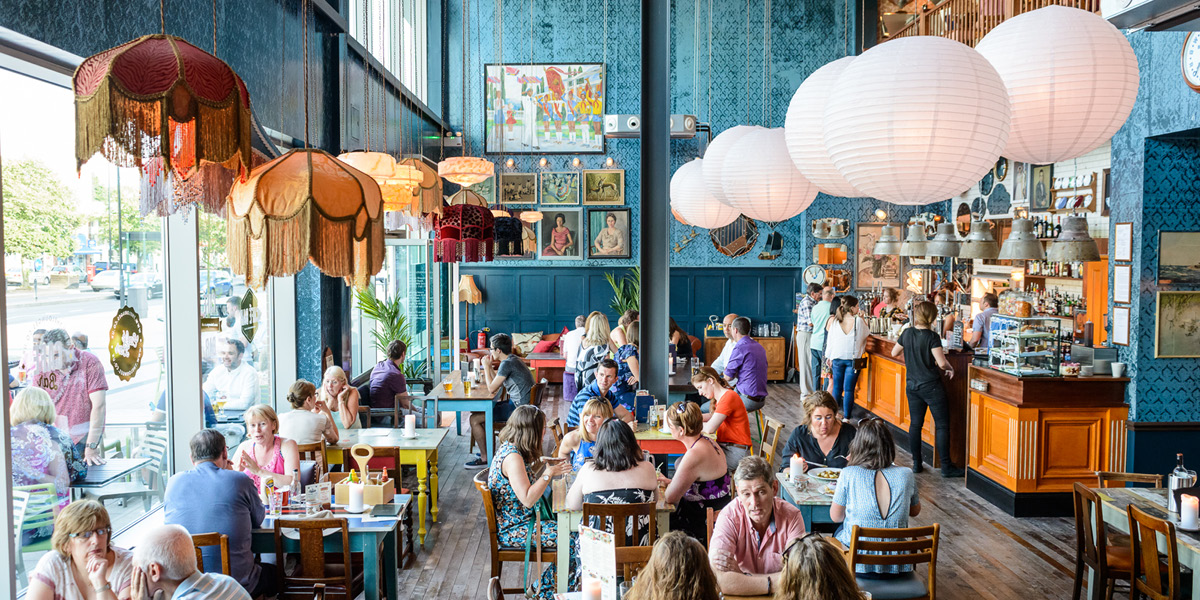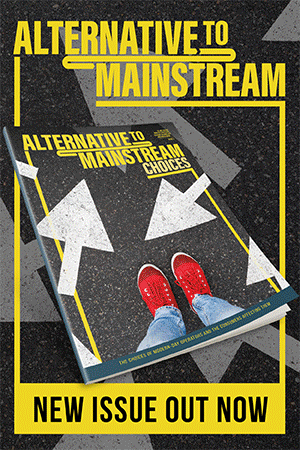Loungers publishes interim results, announces new COO

Loungers, the group that operates the Lounges and Cosy Club brands, has confirmed in its interim results that like-for-like sales increased by 25.1% since reopening in July following the UK's first lockdown.
 The 24 week period being reported on, ending 4 October 2020 includes 11 weeks of lockdown, four weeks of phased re-opening, four weeks of Eat Out to Help Out in August, and five weeks of 'relative normality', albeit this five week period included the introduction of the 'rule of six', the 10pm curfew and local lockdowns in Wales.
The 24 week period being reported on, ending 4 October 2020 includes 11 weeks of lockdown, four weeks of phased re-opening, four weeks of Eat Out to Help Out in August, and five weeks of 'relative normality', albeit this five week period included the introduction of the 'rule of six', the 10pm curfew and local lockdowns in Wales.
The group's rollout plan is back up and running, with three new sites opened to date in the current financial year and venues due to open in Stourbridge and Wolverhampton early in the New Year.
Loungers now expects to open a total of eight sites in the financial year to April 2021, and anticipates returning to a run rate of 25 new site openings per year in the financial year ending April 2022 (creating more than 500 jobs a year).
Eve Bugler will join the business as chief operating officer on 14 December, having previously held roles at McKinsey, Nando’s and more recently founding BabaBoom.
Bugler will take responsibility for the commercial, build and people arms of the business and will sit on Loungers' executive board.
Justin Carter (Lounge MD) and Amber Wood (Cosy Club MD) will continue to report into Nick Collins (Loungers CEO).
“The last six months have been challenging, but I am immensely proud of how we have reacted and delivered such a strong performance," says Collins. "We are fortunate that due to our suburban and market town locations, the flexibility of our offer, and our fantastic team, we have been able to trade well when given the opportunity to open our sites.
"As we dare to look beyond Covid-19, Lounge and Cosy Club have never seemed more relevant, and we approach 2021 with enthusiasm and optimism.
"With the encouraging news on the development of vaccines, it certainly feels like that time is within reach and I would like to say a huge thank you to our teams for their commitment and engagement over these past difficult months.
“We are grateful to the ongoing support we have received from the government, in particular for our employees through the furlough scheme, and recognise our position is one of relative security. However, the recent restrictions imposed are bewildering, unfair, appear to lack any scientific basis and will decimate the hospitality industry across the UK.
"On re-opening in July our sector invested hugely in providing a safe environment for people to eat and drink out, and then demonstrated it was indeed safe during Eat Out to Help Out in August.
"These most recent interventions, at the most critical time of year for the sector, will cost hundreds of thousands of jobs, see the demise of thousands of pubs, bars and restaurants and leave vacant properties across the UK. The impact on the livelihoods and health of the sector’s predominantly young workforce and on communities and high streets across the UK will be felt for years to come.
“I would strongly urge the government to engage with our sector, provide immediate, targeted support where required, and re-consider the ill-thought through policies that have brought much of our industry to its knees.”
Following the government’s announcements last week about the tiered system, which comes into force today (2 December), Loungers has 14 sites trading in Wales, three sites reopening in Tier 1 in England, 91 sites reopening in Tier 2 and 60 sites that remain closed as they are included in Tier 3.
As a result of these decisions, 36% of of the group's sites will be closed for at least the next two weeks.
The financial review in full
The headline financial performance, which saw adjusted EBITDA of £13.2m showing only a relatively modest decline of 8.8% against a revenue decline of 33.0%, can only be understood with the following context:
- The 24 week period being reported on includes 11 weeks of lockdown, four weeks of phased re-opening, four weeks of EOTHO in August, and finally five weeks of relative normality, albeit this five week period included the introduction of the “Rule of 6”, the 10pm curfew and local lockdowns in Wales;
- Tight financial control during lockdown, with all site teams placed on furlough and benefitting from the support of the Coronavirus Job Retention Scheme;
- A rapid return to pre Covid-19 levels of trading. Typically, sites took two to three weeks to achieve pre Covid-19 sales levels;
- The beneficial impact on EBITDA margins of Government initiatives including the temporary reduction in the VAT rate charged on food and non-alcoholic drinks and the business rates holiday; and
- The EOTHO campaign that ran across Monday to Wednesday throughout August and drove substantial incremental volumes without impacting later week volumes
In the period post reopening from 4 July to 4 October headline LFL sales were +25.1%. Excluding the positive impacts of EOTHO and the VAT reduction the underlying LFL result was -1.1%.
This robust underlying performance, allied to the Government initiatives referred to above and described in greater detail below, helped to offset the not insignificant additional costs of operating in a Covid-19 safe environment, notably additional labour costs and Covid-19 consumables spend. The net effect however was a significant expansion in the Adjusted EBITDA margin to 24.7% (2020 18.1%). This margin expansion was driven by the gross profit margin, which increased to 46.1% from 41.5%, a reflection of the flow-through from the VAT reduction only partially being offset by additional labour costs.
Exceptional costs of £0.6m include the costs of:
- Removing and storing excess furniture and soft furnishings from our sites to enable adherence to social distancing requirements; and
- Professional fees in connection with the extension of our banking facilities to provide adequate funding headroom
Impact of UK Government Initiatives
The Group has benefited from a number of UK Government initiatives introduced to mitigate the impact of Covid-19 which we very much welcomed, notably:
- The Coronavirus Job Retention Scheme (“CJRS”) – At the onset of lockdown in March 2020, with all our sites closed, we transferred all site employees and the majority of head office employees (in total 99% of employees) into the CJRS. During the period under the review the Group received a total of £17.2m of funding under the CJRS. A total of £13.1m was recognised in the statement of comprehensive income in the period, offsetting site payroll costs on the costs of sales line and head office payroll costs on the administrative expenses line. Cash receipts included £4.4m that was recognised in the FY20 results and £0.3m was receivable as at 4 October 2020.
- The Eat Out to Help Out Scheme (“EOTHO”) – The Group completed the phased re-opening of all its sites by 7 August and was therefore well-placed to benefit from the EOTHO scheme that ran on Monday to Wednesday throughout August. The Group received total funding under the EOTHO scheme of £5.6m. This has been recognised as revenue in the period.
- Business Rates Relief – The Group’s sites have benefitted from the business rates holiday that runs from 1 April 2020 to 31 March 2021. During the 24 weeks to 4 October the Group has benefitted by £2.5m.
- Retail, Leisure and Hospitality (“RLH”) Grant Fund – In the period under review the Group has recognised £0.6m of grant funding received under the RLH scheme. This income has been recognised under other income.
In addition to the support initiatives described above the Government introduced the Corporate Insolvency and Governance Bill which provided a range of protections for tenants. The Group has sought to work collaboratively with all of its landlords, seeking to reach agreement over an equitable share of the pain of lockdown whilst recognizing the significant support the Group has received. As at 4 October the Group had reached agreement in respect of 69% of its sites, and total deferred rent at that date was £4.5m of which an agreement to defer had been reached in respect of £1.6m. In addition to rent deferrals the Group has recognised £0.6m in the period in respect of rent waivers.
Net debt
Non property net debt reduced to £13.6m at period end, an improvement of £21.9m from the FY20 year end. Reported net debt continues to benefit from deferred liabilities to landlords and HMRC. Adjusting to reflect these deferred liabilities as if they had been paid, net debt at 4 October 2020 would be £25.1m. This represents a reduction of £10.3m relative to the FY20 year end. It is important to note that the timing of the interim results does not flatter the reporting of net debt, coming as it does immediately after the September rent quarter and month end payment runs. In the week prior to the half year end payments totalling £8.6m were made to suppliers, landlords and HMRC.
Finance costs for the period have reduced to £3.3m (2020: £4.5m) reflecting the absence of the exceptional write off of arrangement fees in the prior year. Finance costs include £2.6m (2020: £2.5m) of IFRS 16 lease interest charges.
Cash flow
Net cash generated from operating activities grew by 66.7% to £20.9m (2020: £12.6m). The performance in the period was boosted by a positive swing of £7.4m in the working capital position post reopening, of which £4.1m related to funding under the CJRS.
The positive inflow from operating activities was further boosted by net proceeds of £8.1m from the April 2020 equity raise whilst the cessation of the new site roll-out programme in March saw capital expenditure cash flows in the period fall to £1.4m (2020: £11.2m).
Dividend policy
In the short term, the Board intends to retain the Group’s earnings to bolster liquidity and balance sheet strength and for re- investment in the roll-out of new Lounge and Cosy Club sites. It is the Board’s ultimate intention to pursue a progressive dividend policy, subject to the need to retain sufficient earnings for the future growth of the Group.
Current trading and prospects
The strong performance post reopening and through to 4 October was maintained in the weeks through to the second lockdown on 5 November. Whilst the impact of the 10pm curfew and the increasing number of sites falling into Tiers 2 and 3 was felt , the Group continued to benefit from a very strong performance in its Tier 1 sites, notably in the South West.
It remains unclear how we will trade following re-opening in England and with the latest restrictions in Wales, not least during the Christmas trading period, however the strength of our brands and the manner in which they performed coming out of the first lockdown provides us with confidence for the future.












